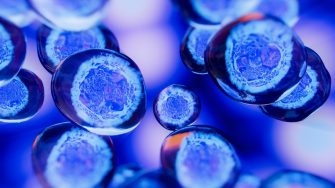
Life as we know it is cellular life. Each cell has a cell membrane that not only protects the contents of the cell, but also controls the flux of nutrients, how the cell grows and divides, and in some cases, generates motility.
The study of model primitive cells, also known as protocells, is considered one of the scientific steppingstones towards understanding the origin of life. But unravelling the mystery of how this most elementary unit of life first formed is no easy task. Although the membrane itself owes its structure to phospholipids, most of the functions are carried out by proteins. This then begs the question: how did primitive cells perform their necessary functions prior to the evolution of these proteins?
We use physicochemical tools to manipulate models of primitive cells and probe their properties. The questions we’re trying to answer include: when is a membrane too leaky? When is it not permeable enough to nutrients? When does it get too stiff to divide? How can we build a protocell life cycle, for protocells to sustainably grow and divide?
There’s still lots to find out -- join us on our journey to make a ‘forever-growing’ protocell!
Are you ready to contribute to world-class research?
Projects run through UNSW are interdisciplinary and include local and international collaborations. The Wang group at the School of Chemistry, UNSW Sydney, works at the intersection of physics, chemistry, materials science, and astrobiology to answer questions about soft matter and the origins of cellular life. Below is a summary of protocell and synthetic cell projects headed by Dr Anna Wang.
Current projects:
Project title: | Contact to email: |
|---|---|
The impact of crowding and membrane proteins on minimal cell growth and division | The Wang Group |
Using crowding and confinement to module liquid-liquid phase separation | |
Robust cycles of growth and division of fatty acid protocells | |
Altering protocell properties with colloidal inclusions | |
Understanding autocatalysis in protocell vesicles | The Wang Group in collaboration with the Fahrenbach Group |
Interested in astrobiology but don’t know where to start?
There are many pathways towards a career in astrobiology at UNSW. Find a course that is right for you here.
Get involved at UNSW!
Join in on the ACA action and come to the ACA Student Seminars Series, which happen regularly on Wednesdays – and enjoy the free pizza! Missed a seminar? You can watch a selection on the ACA YouTube channel.
Are you generally interested in chemistry? Also consider joining Students of Chemistry Society (SOCS)!
Also consider watching NASA Astrobiology’s Prebiotic Chemistry and Early Earth Environments (PCE3) seminars on YouTube.
Curious to learn more now?
Here are some key publications by our academic team:
- Passive endocytosis in model protocells
Stephanie J Zhang, Lauren A Lowe, Palapuravan Anees, Yamuna Krishnan, Thomas G Fai, Jack W Szostak, Anna Wang, Proceedings of the National Academy of Sciences (2023) - Lipid exchange promotes fusion of model protocells
Ziyan Fan, Yaam Deckel, Lauren A Lowe, Daniel WK Loo, Tetsuya Yomo, Jack W Szostak, Collin Nisler, Anna Wang, Small Methods (2023) - Using holographic microscopy to measure the effect of confinement on crowding agents in lipid vesicles
Yaam Deckel, Lauren A Lowe, Siddharth Rawat, Matthew Turner, James Luong, Anna Wang, ChemBioChem (2023) - Dehydration Enhances Prebiotic Lipid Remodeling and Vesicle Formation in Acidic Environments
Luke H Steller, Martin J Van Kranendonk, Anna Wang, ACS Central Science (2022) - Subtle changes in pH affect the packing and robustness of fatty acid bilayers
Lauren A Lowe, James T Kindt, Charles Cranfield, Bruce Cornell, Alexander Macmillan, Anna Wang, Soft Matter (2022) - Bulk self-assembly of giant, unilamellar vesicles
James T Kindt, Jack W Szostak, Anna Wang, ACS Nano (2020)
